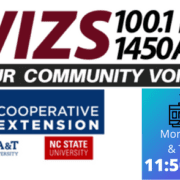The Vance County Sheriff’s Office is between a rock and a hard place, it seems, as it faces a 20 percent vacancy rate – 12 sworn officers – including some who have recently left to take higher paying jobs in other counties.
Sheriff Curtis Brame took his plea to county commissioners during their Aug. 18 work session to ask for help in the form of funding salaries at a level that will attract officers and make them want to stay. Until salaries can become more competitive, Brame said he believes he’ll continue to face vacancies. But with so much money being put into state-mandated renovations and repairs to the jail, county commissioners and staff are at a loss as to where to find the money.
“We have lost valuable, seasoned employees,” Brame said. “Losing a deputy after two years is understandable. When you start losing investigators and SROs, that’s a wakeup call,” he said.
He said two School Resource Officers have left recently to take jobs in other counties – one went to Halifax County and a second went to Granville County.
Maj. William Mitchell recently left to take a state level job with the Standards and Training division. A lieutenant and other seasoned investigators also have left because of salaries. They can make more money elsewhere and work less, Brame said.
Brame said, “I’m here to make a plea. I am facing a crisis. I do not have enough help.”
Commissioners talked about implementing a progression pay scale, according to County Manager C. Renee Perry. That topic was referred to the Human Resources committee, and commissioners ultimately opted to give employees a one-time bonus instead.
Perry said, “We do need to move forward to allow people to move within their pay scale.” She acknowledged that the county is behind other nearby counties for starting pay – most are at $55,000, with the exception of Warren County, which is about $45,000.
The current starting pay for Vance County sheriff’s officers is just above $46,000. Both Vance and Warren counties are Tier I counties, which means they are among the 40 most distressed counties in the state when looking at the average unemployment rate, median household income, percentage growth in population and adjusted property tax base per capita.
Brame said he’d like to see the starting salary increase to $55,000.
The sheriff suggested possibly taking funds from a rainy day fund to boost salaries, something Perry told commissioners she would never recommend doing.
Board Chair Carolyn Faines said, “God knows we understand” that the sheriff’s office employees need more money.
But with all the money the county is putting into renovating the current detention facility, commissioners and county staff are hard-pressed to find even more money to boost salaries.
In response to a question from Commissioner Leo Kelly about what Brame would like to see happen, the sheriff said, “I trust our county manager,” adding that he would like to sit down and talk about numbers.
Perry and Assistant County Manager Jeremy Jones both endorsed the idea of addressing the concept of “compression” before bumping up starting salaries for deputies.
Compression is a way to address employee retention because salaries are based on experience.
At this time, Perry said it would be best to consider this for sworn personnel only, before opening it up to detention staff and other positions.
CLICK PLAY!







